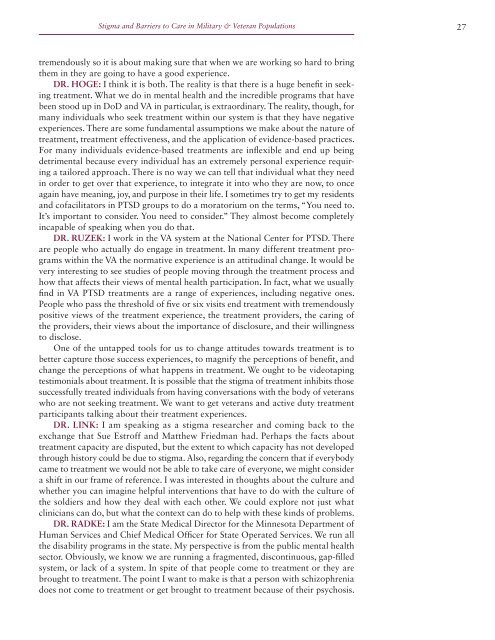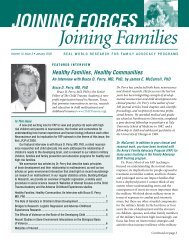stigma and barriers to care - Uniformed Services University of the ...
stigma and barriers to care - Uniformed Services University of the ...
stigma and barriers to care - Uniformed Services University of the ...
Create successful ePaper yourself
Turn your PDF publications into a flip-book with our unique Google optimized e-Paper software.
Stigma <strong>and</strong> Barriers <strong>to</strong> Care in Military & Veteran Populations 27<br />
tremendously so it is about making sure that when we are working so hard <strong>to</strong> bring<br />
<strong>the</strong>m in <strong>the</strong>y are going <strong>to</strong> have a good experience.<br />
DR. HOGE: I think it is both. The reality is that <strong>the</strong>re is a huge benefit in seeking<br />
treatment. What we do in mental health <strong>and</strong> <strong>the</strong> incredible programs that have<br />
been s<strong>to</strong>od up in DoD <strong>and</strong> VA in particular, is extraordinary. The reality, though, for<br />
many individuals who seek treatment within our system is that <strong>the</strong>y have negative<br />
experiences. There are some fundamental assumptions we make about <strong>the</strong> nature <strong>of</strong><br />
treatment, treatment effectiveness, <strong>and</strong> <strong>the</strong> application <strong>of</strong> evidence-based practices.<br />
For many individuals evidence-based treatments are inflexible <strong>and</strong> end up being<br />
detrimental because every individual has an extremely personal experience requiring<br />
a tailored approach. There is no way we can tell that individual what <strong>the</strong>y need<br />
in order <strong>to</strong> get over that experience, <strong>to</strong> integrate it in<strong>to</strong> who <strong>the</strong>y are now, <strong>to</strong> once<br />
again have meaning, joy, <strong>and</strong> purpose in <strong>the</strong>ir life. I sometimes try <strong>to</strong> get my residents<br />
<strong>and</strong> c<strong>of</strong>acilita<strong>to</strong>rs in PTSD groups <strong>to</strong> do a mora<strong>to</strong>rium on <strong>the</strong> terms, “You need <strong>to</strong>.<br />
It’s important <strong>to</strong> consider. You need <strong>to</strong> consider.” They almost become completely<br />
incapable <strong>of</strong> speaking when you do that.<br />
DR. RUZEK: I work in <strong>the</strong> VA system at <strong>the</strong> National Center for PTSD. There<br />
are people who actually do engage in treatment. In many different treatment programs<br />
within <strong>the</strong> VA <strong>the</strong> normative experience is an attitudinal change. It would be<br />
very interesting <strong>to</strong> see studies <strong>of</strong> people moving through <strong>the</strong> treatment process <strong>and</strong><br />
how that affects <strong>the</strong>ir views <strong>of</strong> mental health participation. In fact, what we usually<br />
find in VA PTSD treatments are a range <strong>of</strong> experiences, including negative ones.<br />
People who pass <strong>the</strong> threshold <strong>of</strong> five or six visits end treatment with tremendously<br />
positive views <strong>of</strong> <strong>the</strong> treatment experience, <strong>the</strong> treatment providers, <strong>the</strong> caring <strong>of</strong><br />
<strong>the</strong> providers, <strong>the</strong>ir views about <strong>the</strong> importance <strong>of</strong> disclosure, <strong>and</strong> <strong>the</strong>ir willingness<br />
<strong>to</strong> disclose.<br />
One <strong>of</strong> <strong>the</strong> untapped <strong>to</strong>ols for us <strong>to</strong> change attitudes <strong>to</strong>wards treatment is <strong>to</strong><br />
better capture those success experiences, <strong>to</strong> magnify <strong>the</strong> perceptions <strong>of</strong> benefit, <strong>and</strong><br />
change <strong>the</strong> perceptions <strong>of</strong> what happens in treatment. We ought <strong>to</strong> be videotaping<br />
testimonials about treatment. It is possible that <strong>the</strong> <strong>stigma</strong> <strong>of</strong> treatment inhibits those<br />
successfully treated individuals from having conversations with <strong>the</strong> body <strong>of</strong> veterans<br />
who are not seeking treatment. We want <strong>to</strong> get veterans <strong>and</strong> active duty treatment<br />
participants talking about <strong>the</strong>ir treatment experiences.<br />
DR. LINK: I am speaking as a <strong>stigma</strong> researcher <strong>and</strong> coming back <strong>to</strong> <strong>the</strong><br />
exchange that Sue Estr<strong>of</strong>f <strong>and</strong> Mat<strong>the</strong>w Friedman had. Perhaps <strong>the</strong> facts about<br />
treatment capacity are disputed, but <strong>the</strong> extent <strong>to</strong> which capacity has not developed<br />
through his<strong>to</strong>ry could be due <strong>to</strong> <strong>stigma</strong>. Also, regarding <strong>the</strong> concern that if everybody<br />
came <strong>to</strong> treatment we would not be able <strong>to</strong> take <strong>care</strong> <strong>of</strong> everyone, we might consider<br />
a shift in our frame <strong>of</strong> reference. I was interested in thoughts about <strong>the</strong> culture <strong>and</strong><br />
whe<strong>the</strong>r you can imagine helpful interventions that have <strong>to</strong> do with <strong>the</strong> culture <strong>of</strong><br />
<strong>the</strong> soldiers <strong>and</strong> how <strong>the</strong>y deal with each o<strong>the</strong>r. We could explore not just what<br />
clinicians can do, but what <strong>the</strong> context can do <strong>to</strong> help with <strong>the</strong>se kinds <strong>of</strong> problems.<br />
DR. RADKE: I am <strong>the</strong> State Medical Direc<strong>to</strong>r for <strong>the</strong> Minnesota Department <strong>of</strong><br />
Human <strong>Services</strong> <strong>and</strong> Chief Medical Officer for State Operated <strong>Services</strong>. We run all<br />
<strong>the</strong> disability programs in <strong>the</strong> state. My perspective is from <strong>the</strong> public mental health<br />
sec<strong>to</strong>r. Obviously, we know we are running a fragmented, discontinuous, gap-filled<br />
system, or lack <strong>of</strong> a system. In spite <strong>of</strong> that people come <strong>to</strong> treatment or <strong>the</strong>y are<br />
brought <strong>to</strong> treatment. The point I want <strong>to</strong> make is that a person with schizophrenia<br />
does not come <strong>to</strong> treatment or get brought <strong>to</strong> treatment because <strong>of</strong> <strong>the</strong>ir psychosis.




